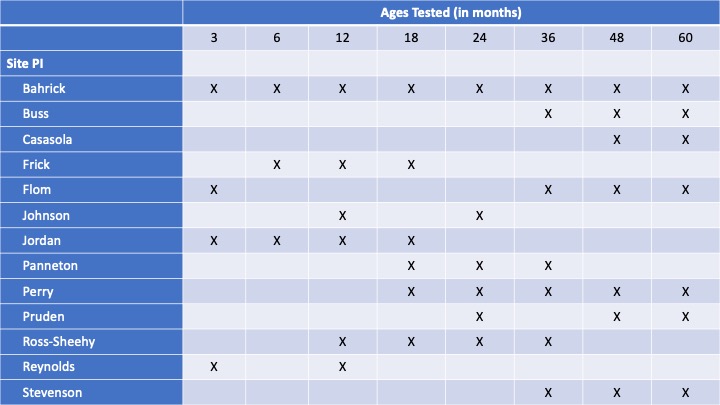MultiNet Project
Multisensory Data Network: A Brief Overview
Disorders of attention, social, and language functioning have become a significant public health concern, yet we lack a systematic database characterizing the typical development of basic building blocks that support optimal outcomes in these domains. Early language and social functioning depend on multisensory attention skills, including disengaging, shifting, and maintaining attention to audiovisual events, and quickly and accurately matching the sights and sounds from unitary events (e.g., faces and voices during speech; objects and the sounds they produce during movement). However, relations between these basic attention skills and later developmental outcomes remain unclear. We addressed these needs by developing the first two protocols appropriate for infants and children capable of assessing individual differences in multisensory attention skills, the Multisensory Attention Assessment Protocol (MAAP), and the Intersensory Processing Efficiency Protocol (IPEP). We then established a collaborative network of research labs (MultiNet) from across the United States and Canada to administer the MAAP and IPEP along with language, social, and cognitive outcomes to more than 1600 children across the ages of 3, 6, 12, 18, 24, 36, 48, and 60 months of age. Each of these labs will contribute to a well-planned, large-scale, shared database.
This collaborative model is more time efficient, cost effective, and will generate a larger, more diverse dataset than possible in individual research labs. Capitalizing on advantages of large datasets, we will derive the first preliminary norms for multisensory attention skills across 3-60 months of age, and test models characterizing developmental cascades from basic multisensory attention skills to more complex language and social capabilities that rely on this foundation. The aggregate database will provide the first characterization of the typical development of fundamental multisensory attention skills, serve as a basis for identifying atypical development of these skills, and inform interventions. Further, it will catalyze new research directions and collaborations and serve as a basis for theses and dissertations. This project should significantly advance knowledge and theory in developmental science, and, at the same time, forge a new model for collaborative research.
Personnel (PI, Co-PIs, Site PIs) and sites PIs and Co-Is (FIU):
- Lorraine E. Bahrick (PI)
- James Torrence Todd (Co-I)
- Shannon Pruden (Co-I)
Primary Performance Site and PI
- Lorraine E. Bahrick (Florida International University) Infant Development Lab
Collaborating Sites and Site PIs:
- Aaron Buss (University of Tennessee, Knoxville)
- Marianella Casasola (Cornell University)
- Janet Frick (University of Georgia)
- Scott Johnson (University of California, Los Angeles)
- Kerry Jordan (Utah State University)
- Robin Panneton (Virginia Tech)
- Lynn Perry (University of Miami)
- Shannon Pruden (Florida International University)
- Greg Reynolds (University of Tennessee, Knoxville)
- Shannon Ross-Sheehy (University of Tennessee, Knoxville)
- Ryan Stevenson (University of Western Ontario)
Consultants:
- Kasey Soska (Data Management Consultant)
- James Jaccard (Statistical/Methodological Consultant)
- Rick Gilmore (Data Sharing Consultant/Databrary Expert)
- Amin Sarafraz (Computer Programmer)
Ages of Children Tested in MultiNet Labs (Cross-sectional and Longitudinal)

Upcoming Trainings and Events
| Event | Date | Time | Description | Who can attend |
| Remote testing implementation |